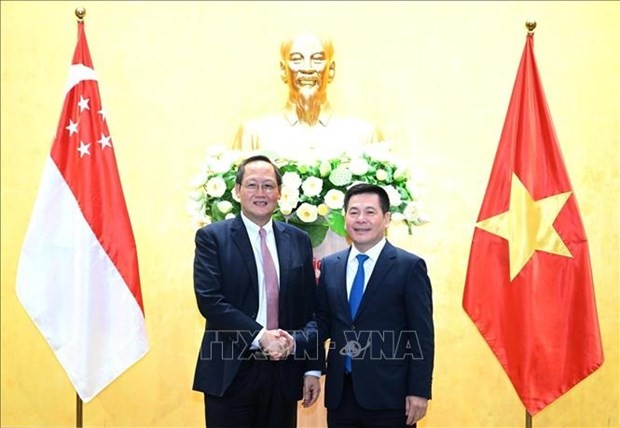
Vietnam, Singapore boost economic, energy cooperation
Latest
 |
| Vietnamese Minister of Industry and Trade Nguyen Hong Dien (R) and Singaporean Second Minister for Trade and Industry Tan See Leng. (Source: VNA) |
Both ministers hailed the existing economic partnership as a model for successful bilateral cooperation in Southeast Asia. They acknowledged a shared interest in expanding collaboration beyond traditional sectors to embrace emerging trends like energy transition, digital economy, digital transformation and green economy.
Energy emerged as the focus of the discussion, with both sides commending ongoing joint projects, particularly those involving clean energy. They emphasised the mutual benefits that could be reaped from ramping up cooperation in this sector.
As there remains numerous potential and existing cooperation opportunities that need to be explored, Tan proposed joint research and implementation with Vietnam, potentially involving other partners, with a special focus on wind and clean energy.
Dien expected that Singapore would share its experience in building relevant policy mechanisms to support robust energy and clean energy cooperation with Singapore and other countries.
He proposed that the working group of the two ministries share technical expertise to translate potential into concrete action.
The Vietnamese minister further suggested fostering human resource development in the energy sector through enhanced collaboration between universities and research institutions. He also sought Singapore's assistance to the Vietnamese ministry's units in building development strategies for industries, energy, trade, digital transformation and green transition.
Singapore is now Vietnam's fourth largest trading partner in the Association of Southeast Asian Nations (ASEAN) and second largest foreign investor.
The two-way trade value hit 9.1 billion USD in 2023 and the figure in the first two months of 2024 already reached 1.5 billion USD.
Last year, Vietnam and Singapore signed the upgraded connectivity framework agreement, under which energy cooperation has become one of the five core pillars.

























